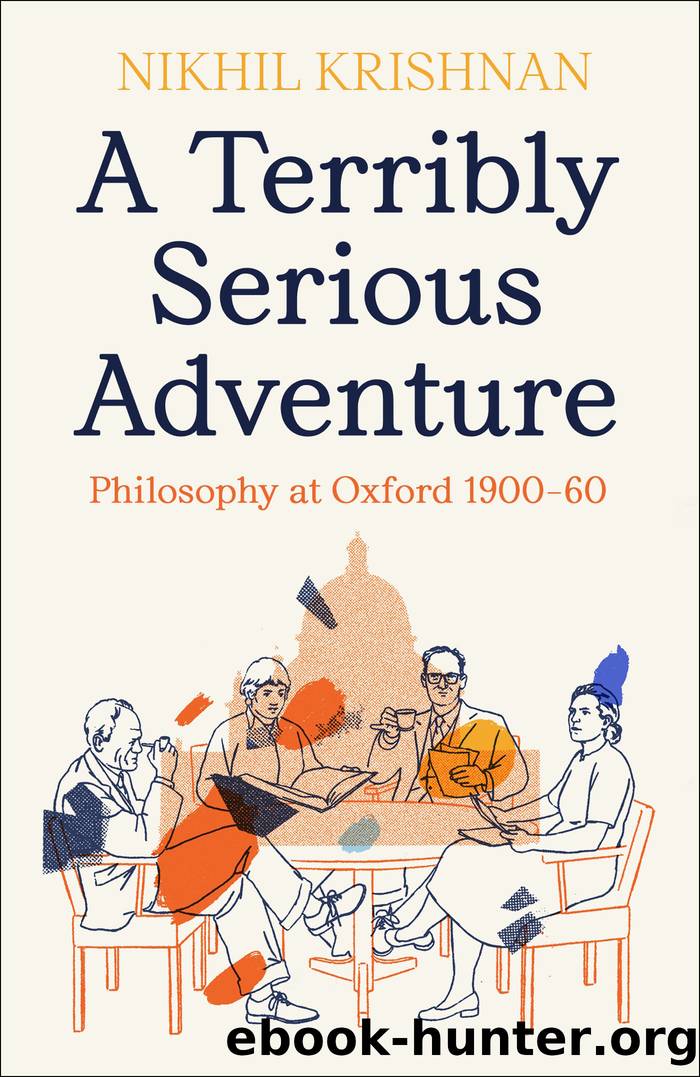A Terribly Serious Adventure by Nikhil Krishnan

Author:Nikhil Krishnan
Language: eng
Format: epub
Publisher: Profile
Published: 2023-05-15T00:00:00+00:00
7
Swimming
Exposing the mistakes of cocky young Englishmen could hardly be the stuff of an entire philosophy. Those errors could be put down to the faults of the individuals concerned, or of their youth, or the malformations of the Oxford syllabus. The sensible-to-a-fault manner of Footâs writings rather tended to encourage this: the methods were fine â they were just being misapplied. In Anscombe, rather more seemed to be at stake than in some parish council squabble, but it was too easy to see her thunderous cadences as merely churchy, just what the cocky young men expected from a Catholic who didnât see that the whole thing was nonsense, really. If one didnât believe in hell, how easy it was to think Anscombe had nothing to tell one.
Iris Murdoch, who returned to Oxford in 1948 a fellow of St Anneâs College, made disengagement harder. Like George Eliot before her, she unsettled the usual triad of âGod, immortality, dutyâ. As Eliot had famously put it, âhow inconceivable the first, how unbelievable the second, how peremptory and absolute the thirdâ.1 Which was one way of saying at least that duty seemed no less absolute for no longer having God for its sanction and immortality for its reward. But âdutyâ was not Murdochâs word; it belonged too much to a picture she ultimately wanted to reject, of ethics as action, decision, choice, will. In some form, the association of ethics with action went back to Aristotle; but go back one generation more, and the analogies were different. In Plato, action was the merest icing; the real ethical moment came when one saw aright, saw oneself, saw other people, saw the natural world in the light of the sun and not of the flickering fires of the cave in which we are captive. And the sun was a symbol not of God â âinconceivableâ â but of the good: peremptory and absolute.
This was a real turn. The undergraduate Murdoch had thought Plato an old reactionary, with nothing to say that Marx (or Freud or Sartre or some other trendy creature from the Continent) had not long superseded. She was unusual among her Oxford contemporaries in having actually read âthe continentalsâ, the long tomes and the novellas.2 Her attachment to the Continent was the first of many things to distinguish her from her colleagues.
Throughout the war, Murdoch had longed to be elsewhere than in the civil service. After the war, whenever that would be, she hoped to teach philosophy and to write novels. She had rued, even at Oxford, the âsecond-handnessâ of her knowledge of much of life.3 She was, in her clumsy way, being useful in London, but if she was going to be bored, she would rather have been bored doing menial things somewhere more dangerous. When she learnt of the existence of the United Nations Relief and Rehabilitation Administration (UNRRA),4 she immediately wanted to work there instead.
She was listening, like everybody else, to live radio broadcasts of reports of the Normandy landings in
Download
This site does not store any files on its server. We only index and link to content provided by other sites. Please contact the content providers to delete copyright contents if any and email us, we'll remove relevant links or contents immediately.
Hit Refresh by Satya Nadella(8338)
When Breath Becomes Air by Paul Kalanithi(7264)
The Girl Without a Voice by Casey Watson(7263)
Do No Harm Stories of Life, Death and Brain Surgery by Henry Marsh(6336)
A Court of Wings and Ruin by Sarah J. Maas(6076)
Hunger by Roxane Gay(4218)
Shoe Dog by Phil Knight(4167)
Everything Happens for a Reason by Kate Bowler(4067)
A Higher Loyalty: Truth, Lies, and Leadership by James Comey(4033)
The Rules Do Not Apply by Ariel Levy(3906)
Tuesdays with Morrie by Mitch Albom(3832)
The Immortal Life of Henrietta Lacks by Rebecca Skloot(3826)
How to Change Your Mind by Michael Pollan(3679)
Millionaire: The Philanderer, Gambler, and Duelist Who Invented Modern Finance by Janet Gleeson(3569)
All Creatures Great and Small by James Herriot(3516)
Elon Musk by Ashlee Vance(3455)
Tokyo Vice: An American Reporter on the Police Beat in Japan by Jake Adelstein(3440)
Man and His Symbols by Carl Gustav Jung(3315)
The Money Culture by Michael Lewis(3284)
